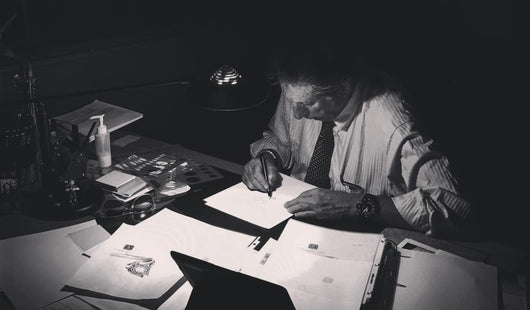
Glossary: Mohs Scale
The Mohs scale of mineral hardness is an important qualitative ordinal scale designed to characterize scratch resistance of minerals based on the ability (or inability) of harder materials to abrade softer material. Read on to learn how this key test is used to determine the durability of jewelry-quality gemstones.
What Does the Mohs Scale Measure?
The Mohs Hardness Test is one of the most famous and important tests for identifying and classifying mineral specimens.
Mohs hardness is a rough measure of the overall resistance of a smooth mineral surface to abrasion or scratching. The values are expressed using a convenient scale devised back in 1812 by Friedrich Mohs, a noted German mineralogist. The Mohs ranking for a mineral is assessed by observing whether its surface is scratched by substances of known hardness.
What is the Range of the Mohs Scale?
The Mohs Scale rates a mineral’s hardness on a scale of 1 to 10. To gain a numerical value for hardness, minerals are ranked along the spectrum of the Mohs scale, which includes 10 minerals that have been awarded arbitrary values for hardness. The minerals contained in the scale include (from softest to hardest):
1. Talc
2. Gypsum
3. Calcite
4. Fluorite
5. Apatite
6. Orthoclase
7. Quartz
8. Topaz
9. Corundum
10. Diamond
Essentially, if a material can be scratched by any of these minerals, it can only receive the corresponding hardness value at maximum. For instance, as indicated on the scale, if a mineral is scratched by quartz but not by orthoclase, its Mohs hardness is between 6 and 7.
Using Common Objects
Some people use a few common objects for Mohs hardness testing in the field. A fingernail, a copper coin, a nail, a piece of glass, a knife blade, a steel file, a streak plate, and a piece of quartz are common objects suggested in some geology textbooks.
What is a 1 on the Mohs scale?
With a 1 on the Mohs scale, talc is the softest mineral substance, followed by gypsum (2), calcite (3) and fluorite (4). The dividing line between softer and harder gems is generally considered to be a Mohs rating of 7, where gemstones with a hardness of at least 7 are considered to be appropriate for rings.
What is a 10 on the Mohs scale?
Diamonds are rated 10 on the Mohs scale of mineral hardness, meaning they are the hardest mineral known to man, except for a few very rare substances. Moissanite, a naturally occurring gemstone that can also be made in a lab, is nearly as hard as diamond.
Toughness, Hardness and Strength
When rating a gemstone for hardness, it’s important to remember that the Mohs test is only used to assess the overall resistance to scratching. During the test, minerals can crumble, deform, or break instead of scratching.
Harder materials often break when put under heavy stress. This is considered a lack of “toughness.” Other materials might crumble or deform in response to stress. These materials are said to lack “strength.” Always keep in mind that the Mohs scale is intended to assess a stone’s resistance to being scratched and not its overall durability.
Why Does it Matter?
Many people assume that since precious gems are stones they should all be durable. In reality, not all precious gemstones have the durability of diamonds.
Most people know that diamonds are strong enough to cut glass. This well-earned reputation is one of the reasons these fiery stones have become associated with engagement; after all, they are lasting, just like true love.
While other stones can be equally beautiful in the eyes of many, they lack the same strength and durability. This isn’t necessarily a problem if you know how to protect them. That said, certain stones won’t hold up well for people who are regularly changing diapers, working with their hands, exercising at the gym and engaging in other rigorous facets of modern life.
This is where a clear understanding of the Mohs Scale can help you. It can also be especially helpful to have insight from a reputable jeweler who can help you choose a beautiful stone that’s appropriate for your jewelry and lifestyle.
Paired with John Atencio’s artfully crafted jewelry pieces, the right stone creates a breathtaking artistic expression of luxury. Explore our online jewelry collection or schedule an appointment at one of our many locations, where our expert team will provide a personalized approach to help you find the best gemstone option for your jewelry.

